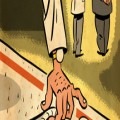2353 shaares
Une cartographie de la science actuelle. Très marrant de voir comme les matheux sont isolés du reste
Moui... l'étude à l'air propre, mais je suis pas convaincu pour la conclusion
Un site permettant de définir un identifiant unique à chaque chercheur. Pour différencier Jean Dupont du CNRS et Jean Dupont de l'USGS. Je sais pas trop si ça va prendre, mais à garder sous le coude
Tiens? un site de life-hacks (via sebsauvage)
Un site marrant avec plein d'images médiévales. Potentiellement utile quand on prépare une présentation, ya plein d'images d'animaux
Oh mais ça m'a l'air intéressant ça! On a de l'info environnementale à échelle fine (e.g. pixels de 100 mètres) et de l'info sur la distribution d'une espèce grossière (genre présence dans un gros quadrat), et on veut une carte de distribution à l'échelle fine. Le gars dit que c'est possible et publie la solution. Bidouillage immonde ou pas? j'ai pas lu, mais incontestablement, c'est à garder sous le coude.
Comment l'empire Google permet de normaliser le puritanisme à l'américaine à l'échelle mondiale
La science ne s'autocorrige pas. TL;DR. Mais à lire un jour
J'aime bien l'image
Très intéressant. Une étude sur la surinterprétation des données:
Extrait:
"My final example is a wonderful study by psychologist Craig Bennett and colleagues, who found statistically significant correlations in a functional MRI scan of a dead salmon. They were using the same sort of analysis that non-joking political scientists use in making claims such as "Red Brain, Blue Brain: Evaluative Processes Differ in Democrats and Republicans," but the difference is that Bennett and his colleagues are open about the fact that these imaging studies have hundreds of thousands of degrees of freedom. The salmon study is beautiful because everyone knows a dead fish can't be thinking, but it's still possible to find patterns if you look hard enough."
J'ai récupéré ledit article. Un poster en fait, qui est encore plus drôle. Extraits savoureux de l'article:
"The salmon was shown a series of photographs depicting human individuals in social situations with a specified emotional valence. The salmon was asked to determine what emotion the individual in the photo must have been experiencing (...) "
Ils font en même temps une IRM du cerveau du saumon mort, et ils ajustent pour chaque voxel un modèle prédisant la réponse hémodynamique. Et font un test par pixel. Sans correction de test multiple. Et ils trouvent des structures! J'aurai bien aimé voir la tête des membres de l'équipe technique à qui on a demandé de montrer les photos pornos à un saumon mort, pendant qu'ils analysaient ses réactions :-)
Extrait de Bennett et al (2009) Neural correlates of interspecies perspective taking in the post-mortem Atlantic Salmon: An argument for multiple comparisons correction.
Extrait:
"My final example is a wonderful study by psychologist Craig Bennett and colleagues, who found statistically significant correlations in a functional MRI scan of a dead salmon. They were using the same sort of analysis that non-joking political scientists use in making claims such as "Red Brain, Blue Brain: Evaluative Processes Differ in Democrats and Republicans," but the difference is that Bennett and his colleagues are open about the fact that these imaging studies have hundreds of thousands of degrees of freedom. The salmon study is beautiful because everyone knows a dead fish can't be thinking, but it's still possible to find patterns if you look hard enough."
J'ai récupéré ledit article. Un poster en fait, qui est encore plus drôle. Extraits savoureux de l'article:
"The salmon was shown a series of photographs depicting human individuals in social situations with a specified emotional valence. The salmon was asked to determine what emotion the individual in the photo must have been experiencing (...) "
Ils font en même temps une IRM du cerveau du saumon mort, et ils ajustent pour chaque voxel un modèle prédisant la réponse hémodynamique. Et font un test par pixel. Sans correction de test multiple. Et ils trouvent des structures! J'aurai bien aimé voir la tête des membres de l'équipe technique à qui on a demandé de montrer les photos pornos à un saumon mort, pendant qu'ils analysaient ses réactions :-)
Extrait de Bennett et al (2009) Neural correlates of interspecies perspective taking in the post-mortem Atlantic Salmon: An argument for multiple comparisons correction.
Ah oui, sympa
Via sebsauvage. À noter: le site a l'air génial
Tiens le prix de la "bad ad hoc hypothesis" a été décerné. Extrait:
Dr. Edward Chung presenting on how Lyme Disease is actually an evolutionary calling for people to stay inside and become nerds, Cornell PhD candidate Stacy Farina theorizing that fish’s low intelligence is a natural protection against existential crisis, among several other high ranking academic minds. The winner, published author and M.I.T. graduate Tomer Ullman, took home the “Shrugging Darwin” with his presentation on how screaming babies were used as adrenaline boosters in ancient societies.
Dr. Edward Chung presenting on how Lyme Disease is actually an evolutionary calling for people to stay inside and become nerds, Cornell PhD candidate Stacy Farina theorizing that fish’s low intelligence is a natural protection against existential crisis, among several other high ranking academic minds. The winner, published author and M.I.T. graduate Tomer Ullman, took home the “Shrugging Darwin” with his presentation on how screaming babies were used as adrenaline boosters in ancient societies.
Plein de ressources sur le bayésien non paramétrique
Le plus gros oiseau que la terre ait jamais porté mesurait 7 mètres d'envergure! l'argentin magnifique...
Les noms des groupes d'animaux en anglais (herd pour éléphants, pack pour wolves, etc.)
Et conspiracy pour corbeaux!
À garder sous le coude, c'est toujours utile
Et conspiracy pour corbeaux!
À garder sous le coude, c'est toujours utile
Une fable qui ressemble beaucoup à certains milieux professionels!
splendide
Une belle défense de l'exploratoire. Il est toujours bon de rappeler que l'approche exploratoire est intéressante
Tiens, un genre de wikipedia pour chercheurs.


